 I opened my review copy of Bookshops: A Reader’s History by Jorge Carrión the week I was to finally visit the famed City Lights Books in San Francisco for a friend’s book launch. Like most avid readers, bookshops have long been an important part of my life—from perusing the dusty stacks of Twice Sold Tales with my dad as a child, trying to figure out if I had enough quarters to add another Stephen King to my collection, to discovering that I actually like the new Elliott Bay Books even better than the old as I thumb through the poetry section at its heart. Still, Bookshops had a lot to teach me about my beloved haunts, both those that are familiar and those that are not.
I opened my review copy of Bookshops: A Reader’s History by Jorge Carrión the week I was to finally visit the famed City Lights Books in San Francisco for a friend’s book launch. Like most avid readers, bookshops have long been an important part of my life—from perusing the dusty stacks of Twice Sold Tales with my dad as a child, trying to figure out if I had enough quarters to add another Stephen King to my collection, to discovering that I actually like the new Elliott Bay Books even better than the old as I thumb through the poetry section at its heart. Still, Bookshops had a lot to teach me about my beloved haunts, both those that are familiar and those that are not.
Travelogue in Bookshop Form
Bookshops is not a reassuring collection of thoughts on why bookstores are important like My Bookstore. Instead it’s filled with micro essays and deep contemplation, glimpses of booksellers both longstanding and soon-to-be forgotten and, yes, loving tributes too. This is a curious book and the way that it’s ordered would drive a researcher mad, but if you surrender to Carrión’s particular labyrinthine logic, it’s magical. For example, you’ll find the history of City Lights Books not in “America (I): Coast to Coast” but instead beside its sister shop, Shakespeare and Company in “Shakespeare and Companies,” a pairing that reminds us geography is only one way of finding kinship. But it’s a fascinating psychogeography and I enjoyed learning about Carrión’s way of thinking as much as I enjoyed learning about the bookshops he describes.
Busting Up My Ethnocentrism
Speaking of geography, one of the highlights of reading Bookshops was Carrión’s Spanish perspective. As much as I feel like I read widely, especially in Latin America and Eastern Europe, he exposed me to so many writers I’d never even heard of. It was a pleasure to step outside the echo chamber of contemporary U.S. writing. While there are North American writers writing in English whom I adore, Carrión reminded me that I’d let my world get too small again and my to-read list is now forever blessed by this book.
Covering bookshops on five continents, Bookshops also reminded me of some of the pleasures of other cultures from haggling to the experience of finding a collection of books in your own language while traveling in a distant land.
Book Learning
I very much enjoyed the way Carrión wove historical tidbits about books and publishing into his narrative with lines like “Books depended on the rag-and-bone man until the 18th century,” a note which forever changed my view of the rag-and-bone man, the books I hold, and our current disposable culture. I had also never stopped to consider that “the first publishing houses comprised groups of copyists” or that the bound nature of a book is something I shouldn’t take for granted.
Carrión also thinks deeply about what it means to be a reader and a writer. His assertion that “literary bookshops shape their discourse by creating a sophisticated taste that prefers difficulty” made me reflect on my own reading and writing habits and desires. While a remark on how “changes of abode and language led to a state of artistic extraterritoriality” fell uncomfortably close to home.
I won’t go into how many of the bookshops Carrión describes closed before he could even put their glory down on paper—it makes me too sad—but maybe that’s part of the importance of experiencing our favorites now and of this loving documentation of the ones that once were. In that way they don’t leave us at all.
Visiting the Hallowed City Lights
“You create books solely to forge links with others, even after your own death.” – Stefan Zweig
Because of my father, the first poet I ever loved was Lawrence Ferlinghetti, which led me to love the idea of the Beat Generation and developed in me a reverence for City Lights Books. But, after a brusque encounter with the man himself at a reading one night, I was reminded of Flaubert’s maxim: “Il ne faut pas toucher aux idoles, la dorure en reste aux mains,” which translates loosely as “don’t touch your idols because the gold might come off on your hands.” So as many times as I’ve walked past this landmark while visiting San Francisco, I’ve never let myself walk in so as to preserve my reverence. But when my grad school advisor and friend was launching her newest book there, I thought it was probably time to get over myself. It seemed too much like one of those confluences of the universe that you probably shouldn’t avoid.
I’m a little shy to say that I rushed into the store and up to the poetry section where the reading would be held, but that particular trip was stretching me in a lot of ways and it’s what I could manage at the time. What I found in that bookstore, though, was better than anything I could have expected. The building that had been built up into some Sacre Coeur-like icon shining brightly from a hill was, once I crossed the threshold, approachable and homely. It felt small and cozy and the reading was mercifully easy to find. The stairs creaked familiarly and I wanted to take pictures of each and every hand-lettered sign encouraging readers to sit and enjoy or the posters for iconic events. But I didn’t. I didn’t have to. City Lights Books became to me one of those places I could sit and absorb. I was at home there. I read an entire book by Kimiko Hahn while waiting for the reading, I met writers old and new. I even met the proprietor of a bookshop whose balcony table became my momentary home—sustaining me during the precarious year after grad school as I scribbled letters to fellow writers trying to keep hold of the community I felt slipping away.
So while for Carrión City Lights was an anchor and a genesis for “new levels of literacy and sophistication in The West after the Second World War,” for me it was a reminder that the bookshop is my home and that when I feel lonely and far from myself, I’d do well to return there. I don’t know if I can make time for weekly letter-writing (and book-buying, let’s be real) field trips to Elliott Bay right now, but I think I’d better try.
To travel the world’s bookshops with Jorge Carrión, pick up a copy of Bookshops: A Reader’s History from the magnificent Bookshop.org. Your purchase keeps indie booksellers in business and I receive a commission.
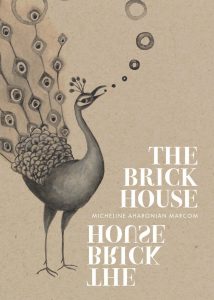 Years ago, when I was still waiting for someone to tell me what it meant to be a writer, I read a panel discussion in Poets & Writers with a group of agents who said you only get one dream per book because dreams are too easy a way to spell out what a character is feeling. The Brick House by Micheline Aharonian Marcom showed me what was really too easy was that quote. By dedicating an entire book to that most revealing condition, she’s shown how complex our dreams, and our lives, really are. My mentor in grad school, I’ve learned a lot from Micheline about how to find my own way as a writer and reading this book showed me not only how far I’ve come but how much farther, still, I can go.
Years ago, when I was still waiting for someone to tell me what it meant to be a writer, I read a panel discussion in Poets & Writers with a group of agents who said you only get one dream per book because dreams are too easy a way to spell out what a character is feeling. The Brick House by Micheline Aharonian Marcom showed me what was really too easy was that quote. By dedicating an entire book to that most revealing condition, she’s shown how complex our dreams, and our lives, really are. My mentor in grad school, I’ve learned a lot from Micheline about how to find my own way as a writer and reading this book showed me not only how far I’ve come but how much farther, still, I can go.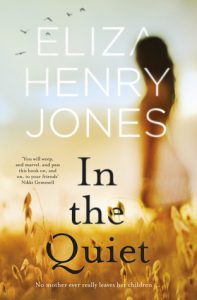 It’s not hard to trigger a newish mom’s “what would happen to my family if something happened to me” fears, but it is hard to sustain a quiet story over 350 pages. In In the Quiet, Eliza Henry-Jones does both so beautifully that not only did I feel immersed rather than manipulated, but I stayed up many hours past bedtime to surrender to the world of this book and to the life of this family.
It’s not hard to trigger a newish mom’s “what would happen to my family if something happened to me” fears, but it is hard to sustain a quiet story over 350 pages. In In the Quiet, Eliza Henry-Jones does both so beautifully that not only did I feel immersed rather than manipulated, but I stayed up many hours past bedtime to surrender to the world of this book and to the life of this family. 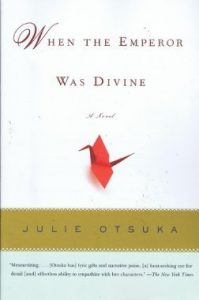 Of all the things that have happened in the months since Trump was inaugurated, none has hit me as hard as the Muslim ban. A lot of things have upset me, but that one struck at my core values. For days after it was announced that America was no longer going to be the land of opportunity for all but instead was going to start openly turning away legitimate immigrants en masse, I was glued to the news and Twitter just waiting to see if we’d come to our senses. I was so tuned into events that I tuned out of my family and simply waited.
Of all the things that have happened in the months since Trump was inaugurated, none has hit me as hard as the Muslim ban. A lot of things have upset me, but that one struck at my core values. For days after it was announced that America was no longer going to be the land of opportunity for all but instead was going to start openly turning away legitimate immigrants en masse, I was glued to the news and Twitter just waiting to see if we’d come to our senses. I was so tuned into events that I tuned out of my family and simply waited.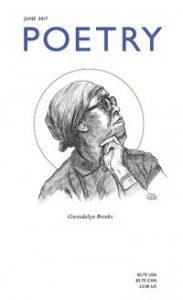 Speaking of people we don’t treat all that well, I’m glad we’re finally having more concerted discussions about race. We need to do more. I’ve spent a lot of time lately thinking about
Speaking of people we don’t treat all that well, I’m glad we’re finally having more concerted discussions about race. We need to do more. I’ve spent a lot of time lately thinking about 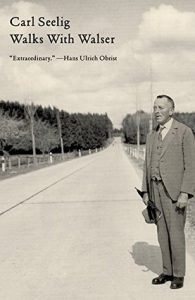 One of the most reassuring and also unnerving things about Walks with Walser, the book I’m currently reading, is seeing that art can both endure terrible times but that it can also remove itself completely from life. Chronicling conversations during the 27 years Robert Walser spent in an asylum after a breakdown, this book spans World War II and yet, because it occurs in Switzerland, barely even acknowledges what’s happening next door. There are some really gorgeous reflections on the life of an artist in this book, but it’s also an important reminder to me that I am not content to check out on the real world. Though I could benefit from a few more long walks.
One of the most reassuring and also unnerving things about Walks with Walser, the book I’m currently reading, is seeing that art can both endure terrible times but that it can also remove itself completely from life. Chronicling conversations during the 27 years Robert Walser spent in an asylum after a breakdown, this book spans World War II and yet, because it occurs in Switzerland, barely even acknowledges what’s happening next door. There are some really gorgeous reflections on the life of an artist in this book, but it’s also an important reminder to me that I am not content to check out on the real world. Though I could benefit from a few more long walks. A former student of political science, I’ve long subscribed to Harper’s to keep my political muscle active. It’s been an important lifeline since the election. I’m not one of those liberals who was completely surprised Trump won, I think the Democratic Party ignored the growing dissatisfaction of lower-income and blue collar Americans. But I am appalled that Trump was elected.
A former student of political science, I’ve long subscribed to Harper’s to keep my political muscle active. It’s been an important lifeline since the election. I’m not one of those liberals who was completely surprised Trump won, I think the Democratic Party ignored the growing dissatisfaction of lower-income and blue collar Americans. But I am appalled that Trump was elected. I thought I was escaping back into fiction when I pulled The Assault off my bookshelf. I remembered Arenas’ languid, gorgeous language and I really needed a little kick to get back to writing. But of course this Cuban-born novelist who was persecuted by his government is famous for writing about that experience.
I thought I was escaping back into fiction when I pulled The Assault off my bookshelf. I remembered Arenas’ languid, gorgeous language and I really needed a little kick to get back to writing. But of course this Cuban-born novelist who was persecuted by his government is famous for writing about that experience.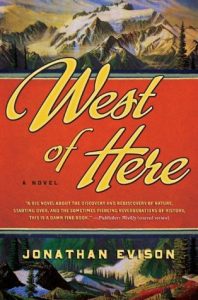 West of Here is not a dystopian book. That might be why I sandwiched it somewhere in the middle of all this heavy reading. In fact, it contains elements of the utopias white people wrote about in the 19th and early 20th centuries as explorers went off to conquer new lands and found paradisaical locales with unlimited natural resources. It also contains stories of the people who were already here and a view into what life is like in those same paradises 100 years later. I love reading Jonathan Evison’s descriptions of places I love. I love his understanding of the simplicity and complexity of human motivations. And I love that a strange mystical vein runs through the story. Dams go up, dams come down. People settle, people perish, people endure.
West of Here is not a dystopian book. That might be why I sandwiched it somewhere in the middle of all this heavy reading. In fact, it contains elements of the utopias white people wrote about in the 19th and early 20th centuries as explorers went off to conquer new lands and found paradisaical locales with unlimited natural resources. It also contains stories of the people who were already here and a view into what life is like in those same paradises 100 years later. I love reading Jonathan Evison’s descriptions of places I love. I love his understanding of the simplicity and complexity of human motivations. And I love that a strange mystical vein runs through the story. Dams go up, dams come down. People settle, people perish, people endure.
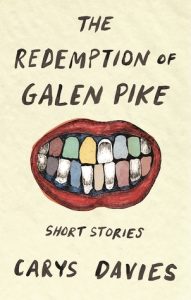 Wicked little books. They’re all I read these days when on a good night I can manage 20 pages and most nights I can’t even remember any of what I read the night before. By wicked little, I mean very short, except in the case of The Redemption of Galen Pike by Carys Davies which is short, but it is also wicked in the most delicious of ways. The stories are compact enough that I could read a few each night if I wanted to, but, more importantly, they are dincredibly well drawn which made them oh-so-memorable. Perfect for a newish mom with a dark sense of humor and an interest in the baser side of human consciousness.
Wicked little books. They’re all I read these days when on a good night I can manage 20 pages and most nights I can’t even remember any of what I read the night before. By wicked little, I mean very short, except in the case of The Redemption of Galen Pike by Carys Davies which is short, but it is also wicked in the most delicious of ways. The stories are compact enough that I could read a few each night if I wanted to, but, more importantly, they are dincredibly well drawn which made them oh-so-memorable. Perfect for a newish mom with a dark sense of humor and an interest in the baser side of human consciousness.